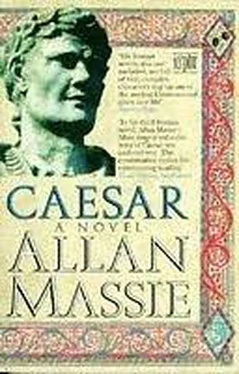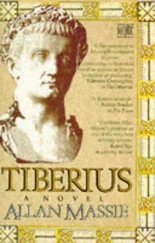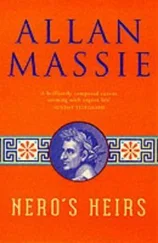Allan Massie - Caesar
Здесь есть возможность читать онлайн «Allan Massie - Caesar» весь текст электронной книги совершенно бесплатно (целиком полную версию без сокращений). В некоторых случаях можно слушать аудио, скачать через торрент в формате fb2 и присутствует краткое содержание. Жанр: Исторические приключения, на английском языке. Описание произведения, (предисловие) а так же отзывы посетителей доступны на портале библиотеки ЛибКат.
- Название:Caesar
- Автор:
- Жанр:
- Год:неизвестен
- ISBN:нет данных
- Рейтинг книги:3 / 5. Голосов: 1
-
Избранное:Добавить в избранное
- Отзывы:
-
Ваша оценка:
- 60
- 1
- 2
- 3
- 4
- 5
Caesar: краткое содержание, описание и аннотация
Предлагаем к чтению аннотацию, описание, краткое содержание или предисловие (зависит от того, что написал сам автор книги «Caesar»). Если вы не нашли необходимую информацию о книге — напишите в комментариях, мы постараемся отыскать её.
Caesar — читать онлайн бесплатно полную книгу (весь текст) целиком
Ниже представлен текст книги, разбитый по страницам. Система сохранения места последней прочитанной страницы, позволяет с удобством читать онлайн бесплатно книгу «Caesar», без необходимости каждый раз заново искать на чём Вы остановились. Поставьте закладку, и сможете в любой момент перейти на страницу, на которой закончили чтение.
Интервал:
Закладка:
"Who can tell?" I said, knowing I was not supposed to supply an answer.
"The first essential is that the Republic should be reconstituted. I am sure Caesar understands this, aren't you? After all, what else can he do? Rome will not tolerate a Perpetual Dictator, the government of a single person. I realise that he may wish to be granted the dictatorship for an indefinite period, that's natural enough, but equally, it must be largely an honorific, at most supervisory, title. If we are to have the government of a single person, what should we call him? A king? We Romans will never tolerate monarchy. Caesar would have to be mad to suppose we might. And one thing we all know about Caesar is that he is not mad. Or is he, young Brutus?"
"You have already answered that question, sir," I replied.
"Quite so. But we must consider that these terrible wars have deprived us of many able men, and torn the heart out of many noble families. The list of the illustrious dead is long and melancholy. Moreover discord, resentment, and the desire for revenge govern many of their heirs. How are the parties to be reconciled? Where shall we find the means of establishing a new concord of the different orders in the State? How shall we reconcile the demands of the victorious soldiery with the rights of landed proprietors? What steps are necessary to re-establish the authority of the consuls? How do we govern this great Empire which we have won? These are all matters which will perplex us during the period of arduous reconstruction which must follow the end of the wars. You, Decimus Brutus, are deservedly deep in Caesar's confidence. What does he plan? How does he propose to. set about this reconstruction? For my part, I cannot see how it can be achieved unless he is prepared to surrender power and authority back to those bodies which properly exercise them. You cannot, it seems to me, perpetuate a system evolved to answer a crisis when that crisis has itself disappeared."
"No doubt Caesar has given consideration to these matters," I said. "They are what must be discussed. I do not think I am at liberty to expatiate further."
The position was delicate, you see. The questions Cicero raised were proper and must indeed have occurred to anyone who had reflected on the situation. I knew, however, that Caesar shied away from exploring them. He preferred always to act according to the promptings of instinct. He was fond of remarking that "Decisions are best made when they force themselves upon you; that is, when the hour is ripe."
But it would have been impolitic to hint in this gathering that we (Caesar's friends, that is) had really no idea of how the Constitution should be reformed post-bellum.
"The question surely is whether, or to what extent, something which has been shattered can ever be repaired?"
The speaker was scarcely more than a boy, an adolescent, whose chin seemed innocent of the razor. He was slight, but compactly made. He had clear grey eyes, sweetly curving lips, and light hair which flopped over his left eye. He spoke in a cool voice, and did not look at the company but seemed to be examining his finely formed and shapely arm which rested on the back of the couch on which he lay. I had arrived late that evening, having been detained on a matter of urgent business, and had not been introduced to him; Cicero, like many egotists, was often careless in his observation of elementary good manners. The boy had looked at me two or three times in the course of our supper, through long eyelashes, smiling as if he knew me and we had an understanding denied to the others present. I wondered who he was, and found myself interested.
Cicero was surprised by his interjection.
"What do you mean?" he said.
The boy hesitated. His tongue stroked his lower lip and he kept his eyes fixed on his arm (golden-brown, shadow-dappled, smooth as alabaster).
"It's presumptuous of me, I know. I've so little experience. But if it was the demands of Empire which broke the traditional structure of the Republic, then I don't see how that can be restored, unless we were to abandon Empire, which is unthinkable."
Cicero pressed the tips of his fingers together, moved them apart, brought them together two or three times, elevated his chin, held the attention of all.
"Hmm," he said, "those are deep thoughts for one so young, and not unintelligent, not unintelligent by any means, no. Let me see now.. Yes. I think I see where you are at error — error which is, as you sagely suggest yourself, perhaps inescapable on account of your inexperience. (And let me say in passing that I commend you for admitting your inexperience, which is a fault to which the young rarely confess, though we might all agree that it vitiates any opinion they might express on any subject.) So, my dear boy, your error consists, in my opinion, for what it is worth," he lowered his chin and smiled on us, "not an inconsiderable worth, I am perhaps entitled to believe on account of the encomia which have been lavished on me during my long and not unproductive career — very well then, your error consists in taking a purely mechanistic view of public affairs. You concentrate on the structure of the Constitution, and observe how it came under strain. But in doing so, you neglect to consider the far more important and significant question, which is not 'How?' but 'Why?' And they are not, give me leave to assure you, by any means the same thing. We can easily see how things fall apart; but why? That goes deeper, and perhaps it requires the wisdom which only age can bring even to commence to offer an answer. So, I must say that in my view we are concerned principally with a question of morality. Yes, morality, not mechanics. The sickness of the Republic lies not in its institutions — institutions which have so gloriously stood the test of time — but in the men who inhabit them. Selfishness now reigns where zeal for the public good used to flourish. We are suffering, that is to say, from what I shall call 'individualism'. What do I mean by that? Simply this: the readiness of men to respond to any public matter with the question, 'What's in it for me? Where may I find personal advantage?' rather than the question that so nobly informed the minds of our forefathers, 'What does Rome require of me?'"
He paused, looked round the table, fixing his gaze on each of us and holding it, till the other turned away, perhaps in embarrassment. Even I found myself lowering my eyes, but when I looked up I saw that the youth who had raised the matter was returning Cicero's scrutiny with a calm and candid look. A smile played around his lips, and he appeared eager to hear what the veteran orator had to impart. There was no insolence in his smile, and I do not believe that even Cicero felt any, but it was Cicero who broke off the exchange and, with an air of urgency, resumed his discourse.
"What does Rome require of me? That is the question I have put to myself throughout my long and not inglorious career. It was in full consciousness of the import of that question that I confronted the information brought to me concerning the foul conspiracy of Catiline. If each of us asks himself that question, we shall know how we should conduct ourselves. This vice, which I call 'individualism', is in my view Greek, not Roman. Let us extirpate it from our public life, and then we shall resume our antique Roman virtue. Individualism is the curse of our age and the occasion of our present discontents…"
His hand shook as he raised his goblet of wine, and he wiped first his lips, then his temples, with a napkin.
For my part, it seemed that he had spoken more dangerously and more rashly than he knew. This term, "individualism", which he had coined: who incarnated it but Caesar?
The party broke up. I contrived to attach myself to the youth who had aroused my interest on account of his demeanour and intelligence.
Читать дальшеИнтервал:
Закладка:
Похожие книги на «Caesar»
Представляем Вашему вниманию похожие книги на «Caesar» списком для выбора. Мы отобрали схожую по названию и смыслу литературу в надежде предоставить читателям больше вариантов отыскать новые, интересные, ещё непрочитанные произведения.
Обсуждение, отзывы о книге «Caesar» и просто собственные мнения читателей. Оставьте ваши комментарии, напишите, что Вы думаете о произведении, его смысле или главных героях. Укажите что конкретно понравилось, а что нет, и почему Вы так считаете.












